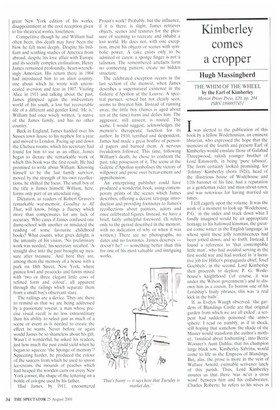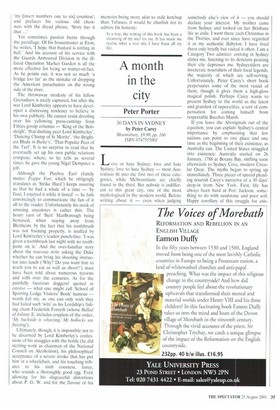Kimberley comes a cropper
Hugh Massingberd
THE WHIM OF THE WHEEL by the Earl of Kimberley Merton Priory Press, £20, pp. 204 ISBN 1898937451 Iwas alerted to the publication of this book by a fellow Wodehousian, an eminent librarian, who expressed the hope that the memoirs of the fourth and present Earl of Kimberley would emulate those of Galahad Threepwood, rakish younger brother of Lord Emsworth, in being 'pure tabasco'. The form certainly looked promising, for 'Johnny' Kimberley (born 1924), head of the illustrious house of Wodehouse and 11th baronet of his line, had a reputation as a gentleman rider and man-about-town, and was notorious for having married six times.
I fell eagerly upon the volume. It was the work of a moment to look up 'Wodehouse, P.G.' in the index and track down what I fondly imagined would be an appropriate homage to his hallowed kinsman, the greatest comic writer in the English language, in whose spirit these jolly reminiscences had been jotted down, and so forth. Instead, I found a reference to 'that contemptible little man', who had avoided serving in the first world war and had worked in 'a lucrative job for Hitler's propaganda chief, Josef Goebbels', in the second. Lord Kimberley then proceeds to deplore P. G. Wodehouse's knighthood ('of course, it was under the Wilson government') and to disown him as a cousin. To borrow one of his Lordship's fruity phrases, this was 'a real kick in the balls'.
If. as Evelyn Waugh observed, 'the gardens of Blandings Castle are that original garden from which we are all exiled', a serpent had suddenly poisoned the atmosphere. I read on numbly, as if in shock, still hoping that somehow the shade of the Master would transform the author's mother, 'fanatical about foxhunting', into Bertie Wooster's Aunt Dahlia; that his champion large black sow, Kimberley Sabrina, would come to life as the Empress of Blandings. But, alas, the prose is more in the vein of Wallace Arnold. estimable scrivener lately of this parish. Thus, Lord Kimberley assures us that there 'was ne'er a cross word' between him and his collaborator, Charles Roberts; he refers to his wives as 'my [insert numbers one to six] countess'; and prefaces his various old chestnuts with the dread phrase, 'Story has it that ...'
Yet sometimes passion burns through the persiflage. Of his housemaster at Eton, he writes. 'I hope that bastard is rotting in hell.' And his account of his service with the Guards Armoured Division in the illfated Operation Market Garden is all the more effective for being so matter-of-fact. As he points out, it was not so much 'a bridge too far' as the mistake of dropping the American parachutists on the wrong side of the river.
The throwaway modesty of his fellow Grenadiers is nicely captured, but after the war Lord Kimberley appears to have developed a distressing tendency to believe in his own publicity. He cannot resist drooling over his yellowing press-cuttings from Fifties gossip columns — 'King of the Bobsleigh', 'that dashing peer Lord Kimberley', 'Dancing Champ of St Moritz', 'the Brightest Blade in Burke's', 'That Popular Peer of the Turf. It is no surprise to read that he eventually set up his own public relations company, where, so he tells us several times, he gave the young Nigel Dempster a job.
Although the Playboy Earl (family motto: Frappe Fort, which he obligingly translates as 'Strike Hard') keeps assuring us that he had a whale of a time — `by God, I enjoyed it while it lasted' — he fails convincingly to communicate the fun of it all to the reader. Unfortunately his stock of amusing anecdotes is rather thin. The hoary yarn of 'Bert' Marlborough being bemused, when staying away from Blenheim, by the fact that his toothbrush was not foaming properly, is muffed by Lord Kimberley's leaden punch-line: 'I was given a toothbrush last night with no toothpaste on it.' And the over-familiar story about the nouveau riche asking the Duke whether he can bring his shooting instructor into lunch ('Why? Do you want him to teach you to eat as well as shoot?') must have been told about numerous tycoons and toffs over the centuries. As for the painfully facetious doggerel quoted in extenso — what one might call 'School of Sporting Lodge Visitors' Book' humour — words fail me, as one can only wish they had failed such 'wits' as his Lordship's fishing chum Frederick Forsyth (whose Ballad of Johnny K includes couplets of the order, 'My backside is wheezing,' My bollocks are freezing).
Ultimately, though, it is impossible not to be disarmed by Lord Kimberley's confessions of his struggles with the bottle (he did sterling work as chairman of the National Council on Alcoholism), his philosophical acceptance of a severe stroke that has put him in a wheelchair, and his touching tributes to his sixth countess, Janey, who sounds a thoroughly good egg. Even allowing for his disgraceful distortions about P. G. W. and for the flavour of his memoirs being more akin to stale ketchup than Tabasco, it would be churlish not to admire his honesty:
In a way. the writing of this book has been a cleansing of my soul for me. It has made me realise what a real shit I have been all my life,



























































 Previous page
Previous page